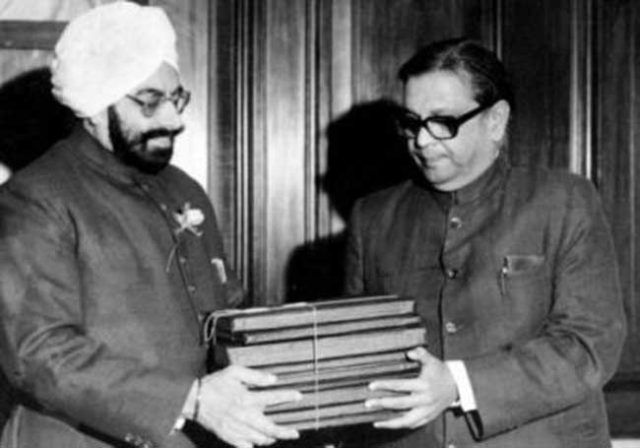PREVIOUS
Bindheshwari Prasad Mandal
September 6 , 2018
2413 days
8144
0
Bindheshwari Prasad Mandal
- - - - - - - - - - - -
Early Life
- P. Mandal was born on 1918 in a Yadav family in Banaras.
- He was raised in the village of Murho, in the Madhepura District (formerly Saharsa District) of northern Bihar.
- He received his early education in Madhepura and he attended Raj High School in Darbhanga and matriculated at Patna College.
- He worked as an Honorary Magistrate from 1945 to 1951.
- This year marks the 100th birth anniversary of Mandal and also marks the 25th anniversary of the implementation of his Commission report.

Political Life
- Mandal’s political career began with the Indian National Congress but he joined the Janata Party after the Emergency Period.
- He served as a Chief Minister of Bihar for 30 days in 1968, a period of intense political instability
- He elected as a Member of Parliament in the Lok Sabha for the state of Bihar from 1967 to 1970 and 1977 to 1979.
Civil rights commission
- Adhering to Article 340 of the Constitution of India, In December 1978, a five-member civil rights commission a (first commission – 1955 - Kalelkar Commission) was set up by the Government of India headed by Prime Minister Morarji Desai under Mandal’s chairmanship popularly known as Mandal Commission
- It aims to identify the socially or educationally backward classes and consider the question of seat reservations and quotas for people to redress caste discrimination.
- The Commission adopted eleven criteria which could be grouped under three major headings: social, educational and economic to identify who qualified as an "other backward class,"
- Mandal commission’s report was completed in 1980 and recommended that a significant proportion of all government and educational places be reserved for applicants from the Other Backward Classes.
- It estimated the population of OBCs as 52% and recommended that 27% of all post under the Central Government should be reserved for OBCs.
- Apart for the reservations in jobs, the Commission also made many other recommendations that include reservations in the promotions, land reforms in the favour of OBC’s, opening of technical institutes relating to the occupations of OBC’s, special division in all the ministries for the welfare of OBC’s, and review of the progress made for the welfare of OBC’s in every 20 years.
- After being neglected for 10 years, the Report was accepted by the National Front government led by V.P. Singh. On August 7 1990, it declared that it would provide 27 percent reservations to "socially and educationally backward classes" for jobs in central services and public undertaking.
- It Having released the Government Order on 13 August, V.P. Singh announced its legal implementation in his Independence Day speech two days later.

Indra Sawhney case
- The same year, a case was brought before the Supreme Court which challenged the constitutional validity of the Government Order for the implementation of the Mandal Report recommendations.
- The five-judge Bench of the Supreme Court issued a stay on the operation of the Government Order later in its verdict, upheld the government order.
- National Commission For Backward Class was the outcome of Indra Sawhney Vs. Union of India.
- On 16 November 1992, the Supreme Court upheld the Mandal Commission’s 27 % quota for backward classes, as well as the principle that the combined scheduled-caste, scheduled-tribe, and backward-class beneficiaries should not exceed 50 percent of India’s population.
- At the same time, the court also struck down the government notification reserving 10% government jobs for economically backward classes among the higher castes.
- The opinion of the Supreme Court in the Indra Sawhney case is summarized as below:
- Backward Classes of the Citizens can be identified on the basis of caste and not only on the economic basis.
- The creamy layer can be and must be eliminated from the Backward Classes.
- Permit to the further classification of backward classes into more backward classes.
- Reservation shall not exceed 50%. but this rule should be applied every year. However, it may be relaxed in favor of people from far-flung and remote areas because of their peculiar conditions.
- Carry forward rule is valid but it is subject to 50%
- There should be NO reservation in the Promotions.
- Thus, the recommendation of reservations for OBCs in central government services was finally implemented in 1992.
Tamil Nadu condition
- Already, In Tamil Nadu, OBC reservations as 2 Parts with 30% for OBC and 20% for MBC. Separate Reservation of 18% and 1% introduced for Scheduled Castes and Scheduled Tribes respectively. Total Reservation percentage stood at 69%.
- This Reservation was included in 9th Schedule via 76th Constitutional Amendment Act on 31 August 1994 during J. Jayalalithaa’s (AIADMK) term.

- - - - - - - - - -
Leave a Reply
Your Comment is awaiting moderation.


